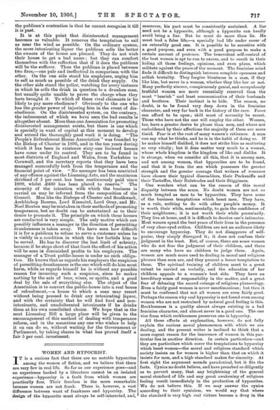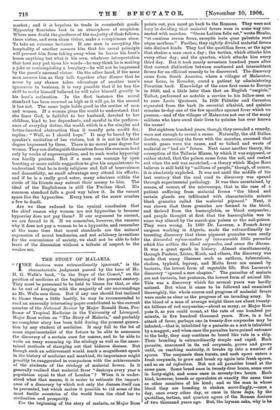WOMEN AND HYPOCRISY.
IT is a curious fact that there are no notable hypocrites among the women of fiction, and we believe that there are very few in real life. So far as our experience goes—and an experience backed by a literature cannot be an isolated experience—hypocrisy is a fault from which women are practically free. Their freedom is the more remarkable because women are not frank. There is, however, a vast difference between want of frankness and hypocrisy. The design of the hypocrite must always be self-interested, and, moreover, his part must be consistently sustained. A liar need not be a hypocrite, although a hypocrite can hardly avoid being a liar. But he must do more than lie. He must lead a false life,—a specially bad life under cover of an ostensibly good one. It is possible to be secretive with a good purpose, and even with a' good purpose to make a certain amount of pretence. The benevolent self-control of the best women is apt to run to excess, and to result in their hiding all those feelings, opinions, and even plans, which militate against the peace of the moment. The feminine mind finds it difficult to distinguish between complete openness and selfish brutality. They forgive bluntness in a man, if they like him, but never in a woman, whether they like her or not.
Many perfectly sincere, conspicuously genial, and scrupulously truthful .women are more essentially reserved than the most " bearish " and least communicative of their husbands and brothers. Their instinct is to bide. The reason, no
doubt, is to be found very deep down in the feminine character, and very far back in the history of the race. Force can afford to be open ; skill must of necessity be secret.
Those who have not the one will employ the other. Women, too, have a greater desire to please than men, and where not emboldened by their affections the majority of them are more timid. Fear is at the root of many women's reticence. A man can say what be thinks, and be is in the habit of doing so. If
he makes himself disliked, it does not strike him as mattering so very vitally; but it does matter very much to a woman, whose whole kingdom is the kingdom of like and dislike. It is strange, when we consider all this, that it is among men, and not among women, that hypocrites are to be found, and that it is from the sex which possesses the greater strength and the greater courage that writers of romance have chosen their typical dissemblers, their Pecksniffs and their Tartaffes, their Bulstrodes and their Stigginses.
One wonders what can be the reason of this moral disparity between the sexes. No doubt women are not so much tempted as men to be hypocrites. They have none of the business temptations which beset men. They have, as a rule, nothing to do with other people's money. It is worth their while, sentimentally, to gain the confidence of their neighbours ; it is not worth their while pecuniarily. They live at home, and it is difficult to deceive one's intimates.
Most women spend the best years of their lives in the presence of very clear-eyed critics. Children are not an audience likely to encourage hypocrisy. They do not disapprove of self- praise, they simply disregard it; it does not confuse their judgment in the least. But, of course, there are some women who' do not fear the judgment of their children, and there are many who have no children to judge them. Again, women are much more used to dealing in moral and religious phrases than men are, and they present a lesser temptation to them. The spiritual training of children must to a great
extent be carried on verbally, and the education of her children appeals to a woman's best side. They have an hereditary sense of responsibility in the matter, and a great
fear of debasing the sacred coinage of religious phraseology.
Even a fairly good woman is never sanctimonious; but then it must be confessed that not all women are even fairly good.
Perhaps the reason why meal hypocrisy is not found even among women who are not restrained by natural good feeling is this. Recklessness is a quality almost always existing in a bad feminine character, and almost never in a good one. The one vice from which recklessness preserves one is hypocrisy.
All these efforts at explanation, however, do not fully explain the curious moral phenomenon with which we are dealing, and the present writer is inclined to think that a more cogent reason for the innocence of women in this par- ticular lies in another direction. In certain particulars—and they are particulars which cover the temptations to hypocrisy which beset women—the moral and religious standard which society insists on for women is higher than that on which it insists for men, and a high standard makes for sincerity. At first sight the argument sounds paradoxical, but it fits the facts. Cynics no doubt believe, and have preached so diligently as to pervert many, that any heightening of the general moral standard of life and any great awakening of religious feeling result immediately in the production of hypocrites. We do not believe this. If we may answer the cynics according to their cynicism, we would say that where the standard is very high real virtues become a drug in the
market ; and it is hopeless to trade in counterfeit goods. Hypocrisy flourishes best in an atmosphere of suspicion. Where men doubt the goodness of the majority of their fellows, there virtue, and even sham virtue, make a conspicuous show. To take an extreme instance. If one man in accepting the hospitality of another assures him that his moral principle will prevent him from taking away when he leaves his host's house anything but what is his own, whatever interpretation that host may put upon his words—he may think he is making a joke or contemplating a burglary—he will not be impressed by the guest's unusual virtue. On the other hand, if the same man assures him as they talk together after dinner that he never by any chance takes advantage of another man's ignorance in business, it is very possible that if he has the skill to make himself believed he will raise himself greatly in his host's estimation. In the first instance the moral standard has been screwed as high as it will go, in the second it has not. The same logic holds good in the matter of men and women. If a woman gives the world to understand that she fears God, is faithful to her husband, devoted to her children, kind to her dependents, and careful in the perform- ance of everyday duties, the world, which is a far simpler and better-hearted abstraction than it usually gets credit for, replies : "Well, so I should hope." It may be bored by the speaker's recitation of her virtues, but it is not in the least degree impressed by them. There is no moral pass degree for women. They can distinguish themselves from the common herd only by works of supererogation, and to such works hypocrisy can hardly pretend. But if a man can manage by open boasting or more subtle suggestion to give his acquaintance to understand that he is truly religious and full of benevolence and domesticity, no small advantage may attend his efforts; and if he is a really good actor, many admirers within the circle of his friends may entrust their money to him. The ideal of the Englishman is still the Puritan ideal. His common standard falls a good way below it. In the vacant space live the hypocrites. Every turn of the screw crushes a few to death.
Are we then reduced to the cynical conclusion that the chief reason why women are not hypocrites is because hypocrisy does not pay them? If our argument be correct, we are forced to it. If we remember, however, the reasons why it does not pay a woman to be a hypocrite, and remember at the same time that moral standards are the natural expression of moral tendencies, and not arbitrary inventions for the convenience of society, we shall not be able to take leave of the discussion without a tribute of respect to the weaker sex.















































 Previous page
Previous page